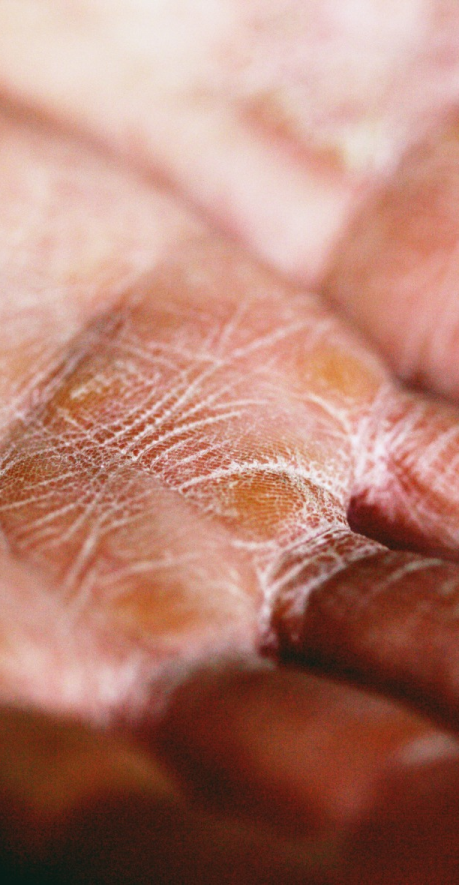Home / Scalp & Shaft Conditions
In the realm of hair health, the scalp and hair shaft serve as vital indicators of overall well-being. At our medical clinic, we recognize the integral connection between a healthy scalp and robust hair shafts. Beyond aesthetic concerns, these aspects often reflect underlying health conditions. Our experts specialize in diagnosing and treating scalp issues, ensuring optimal conditions for hair growth and vitality.
Dry hair, as understood in Trichology, is often the result of damage to the hair shaft. Factors contributing to this scalp & shaft condition include frequent heat styling, over-processing through excessive use of chemicals, and exposure to environmental stressors. These issues hinder the hair’s ability to acquire and retain moisture, leading to increased vulnerability to breakage and brittleness.
The sebaceous glands can also play a part in causing dry hair. These glands produce sebum, a natural oil that works similar to conditioner for the hair and scalp. An imbalance in sebum production, influenced by genetic factors, hormonal changes, or environmental conditions, can contribute to dryness. Insufficient sebum production by the sebaceous glands results in the scalp losing its natural moisture. This leads to a lack of the softening required for both the hair roots and strands.
Restoring the health and flexibility of dry hair involves discontinuing damaging hair care habits, eliminating harsh hair care products, and adopting a scalp care routine. The latter includes considerations like using the appropriate shampoos and ensuring a diet that supports the health of both the hair shaft and the sebaceous glands. Trichologists play a crucial role in maintaining an optimal balance for the sebaceous glands, ensuring they produce sufficient sebum to keep the hair moisturized and healthy. Combatting dry brittle hair also involves the use of the right products, diet, and hair care regimen.

Dry scalp can be due to a lack of natural oils, resulting in flakiness and occasional itching. The causes of dry scalp are diverse and can encompass factors such as the use of harsh hair products, changes in weather conditions, or underlying skin issues.
Crucially, the sebaceous glands play a pivotal role in scalp health producing sebum, a natural oil that keeps both the hair and the scalp soft. An imbalance in sebum production, influenced by genetic factors, hormonal shifts, or environmental elements, can contribute to dry scalp. When the sebaceous glands produce insufficient sebum, the scalp loses its natural moisture, leading to dryness and flakiness, accompanied by occasional itching.
Addressing dry scalp involves a multifaceted approach. Using the appropriate shampoos can help to replenish lost moisture, while avoiding hot water prevents further drying. Adopting a consistent scalp care routine is key to restoring the moisture balance. Additionally, understanding the factors influencing sebum production, including genetic predispositions and hormonal changes, provides insights into managing and preventing dry scalp and shaft conditions. By nurturing a healthy balance, the sebaceous glands can produce adequate sebum, contributing to a well-moisturized and nourished scalp.
Limp or dull hair lacks volume and shine, often stemming from factors like product buildup, excessive washing, or inadequate nutritional support. To revive vitality and shine, a proper hair care routine should include regular cleansing, the use of volumizing products, and ensuring a balanced and nourishing diet.
An itchy scalp can result from various factors, including dryness, product residues, or underlying skin conditions. The sebaceous glands play a role in maintaining scalp health, and when imbalances occur, it can contribute to discomfort. Trichologists offer insights into addressing these factors, recommending appropriate products and care routines, and aiming to improve the functioning of the sebaceous glands. Adopting a holistic approach that considers both external and internal factors is essential for managing and preventing persistent scalp itchiness.
Dandruff, scientifically known as pityriasis capitis, is a prevalent scalp problem marked by non-inflammatory scaling throughout the entire scalp. The precise cause of dandruff remains unknown, although an abundance of the yeast “malassezia globosa” is often associated with it presenting as white or grey scales. The role of this yeast in causing dandruff is not fully understood, but the efficacy of certain shampoos designed to eliminate yeast suggests a potential causal link.
Other factors like cosmetic products applied to the scalp and dietary considerations are also implicated. Cosmetics, particularly shampoos that mildly irritate the scalp, may trigger scaling as a protective response to alleviate irritation. Dietary deficiencies in essential nutrients could contribute to excessively scaly skin, indicating a potential connection between nutrition and the manifestation of dandruff.
Psoriasis is an autoimmune issue triggered by events such as infections, skin trauma, or stress. Unfortunately, this condition is on the rise and is one of the most common scaly problems treated in trichology clinics, affecting both children and adults. While it often appears on the scalp, psoriasis can manifest on any part of the body, such as elbows and knees. The appearance can differ significantly among individuals, with variations in patch shape, color, and silvery-white scales on red, inflamed skin. Dense scales, firmly attached to the skin, may conceal the redness, and scratching may lead to bleeding. Patches may also appear behind and within the ears. Psoriasis intensity fluctuates, with occasional hair loss in severely affected areas.
Genetic predisposition is a factor, but triggers like stress, certain medications, smoking, excessive alcohol intake, and dietary factors (e.g., gluten), and even the winter months can worsen psoriasis.
Eczema is a complex skin condition that can affect the scalp resulting in inflammation, redness, and itching. This condition can disrupt the normal functioning of the skin barrier, leading to discomfort and, in some cases, hair loss.
Specialized shampoos, topical treatments, and certain lifestyle adjustments help to alleviate symptoms and promote a healthier scalp environment. The complexities of eczema require a comprehensive approach, taking into account individual variations in symptoms and triggers.
Trichologists focus on managing inflammation, restoring scalp health, and stress the need for continuous monitoring and personalized interventions to ensure optimal care for both the skin and hair.
Seborrheic dermatitis is a common skin condition characterized by inflammation, redness, and flaking, particularly in areas with a high density of sebaceous glands, such as the scalp. It is associated with the overproduction of sebum, a waxy, oily substance that contributes to the development of scales and dandruff. The condition can affect individuals of all ages, and its severity can vary.
Genetic predisposition, hormonal fluctuations, and the presence of the yeast Malassezia on the skin are believed to contribute to seborrheic dermatitis. Factors like stress, immune system dysfunction, and neurological conditions can exacerbate the condition. Treatment typically involves specialized shampoos, topical solution, and lifestyle adjustments to manage symptoms and prevent flare-ups.
Seborrheic dermatitis not only impacts the skin but can also affect the hair, leading to dandruff and sometimes contributing to hair loss. Proper diagnosis and a meticulous approach that addresses the underlying causes are crucial for effective management.

Hours of Operation
Sunday – Monday: Closed
Tuesday – Friday: 11am-7pm
Saturday: 9:30 am- 5:30pm
Have questions about our services? Schedule a FREE 30 minute consultation.